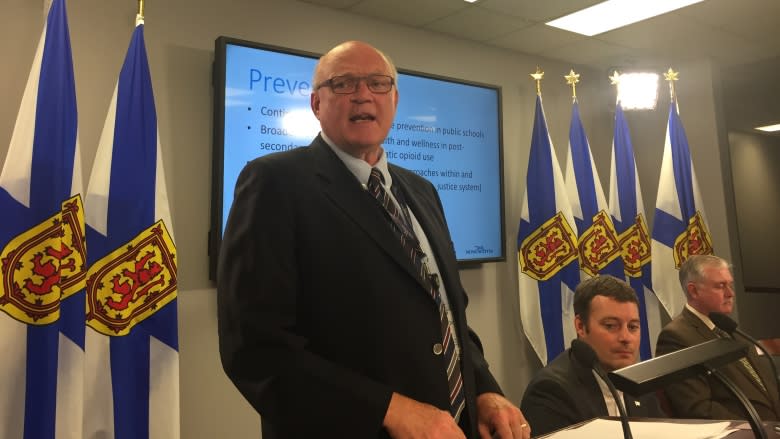Life-saving naloxone for opioid overdoses to be offered for free
Pharmacies in Nova Scotia will soon give out a potentially life-saving medication used in opioid overdoses for free and without a prescription as the province ramps up its fight against a drug epidemic spreading across Canada.
Starting Sept. 1, anyone seeking a kit of injectable naloxone will be able to get one at no cost simply by stopping by their local pharmacy — no ID needed. The kits normally cost between $10 and $25.
"By putting naloxone in pharmacies, we want to make it accessible to everyone in a convenient and trusted location, one that doesn't carry a stigma if you're to go in to visit," Health Minister Randy Delorey said Wednesday as he announced the $500,000 program.
"I would urge people in the province with family members, friends and other loved ones who are using opioids to visit the local pharmacy this fall and ask for a kit."
Plan includes tracking fatal overdoses
Along with the kit, pharmacists will also provide information on how to recognize an overdose and how to administer naloxone.
The initiative is part of the province's new plan to deal with opioid abuse and overdoses.
The province said there have been 24 confirmed and five probable deaths from opioid toxicity this year alone. As of Wednesday, the province has been publicly tracking and posting overdose figures on a government web page that will be updated monthly.
Delorey said more than 2,400 Canadians died last year from accidental drug overdoses. Of those deaths, 60 occurred in Nova Scotia.
"We may not be seeing the opioid use and overdose at the same levels here in Nova Scotia as they are seeing in other parts, particularly the western parts of Canada," said Delorey.
"But we do know that the issue is growing and it is moving east."
Naloxone kits in hands of EHS, police
In response to the potential threat, Delorey said the province has been preparing by making naloxone and proper training available.
He said people who call 911 during an overdose will be told how to use a naloxone kit, while paramedics and many volunteer medical first responders in rural areas carry the drug and know how to use it.
Naloxone has also been distributed to 130 sheriffs, 86 corrections officers and more than 1,900 police officers across Nova Scotia, he said.
Const. Asif Khan of the Bridgewater Police Service said the training allowed him to save a man he had picked up for public drunkenness last March. When he found the man passed out in his jail cell, Khan administered a nasal spray version of naloxone.
"I was lucky I had the naloxone spray available on me and I was able to deploy it with the symptoms that I had in front of me and how quickly the situation deteriorated," he said.
5 key areas
Nova Scotia's chief medical officer of health, Robert Strang, helped create the new plan to deal with the growing opioid problem. It includes five key components:
- Understanding the issue
- Prevention
- Harm reduction
- Treatment and prescribing practices
- Criminal justice and law enforcement
Strang told reporters work is underway in each of these areas, but he put particular emphasis on the need to find ways to reduce the number of people dependent on opioids for pain relief.
Doctors are being encouraged to reduce the number of opioid prescriptions they write and to seek alternative pain relief methods. As well, the Nova Scotia Health Authority is creating an inventory of public and private chronic pain services, said Strang.
Reducing opioid dependency takes time
As for reducing the amount of opioids individuals rely on for pain, Strang said that takes time and great care.
"We have to be very careful that we don't make changes to current prescriptions rapidly," he said.
"The last thing we want to do is to cut people off or rapidly decrease their prescription and then they're looking to illegal sources of opiods."
Those illegal drugs are Roger Merrick's focus as the director of public security at the provincial Justice Department.
He said police forces need to improve how they share information on drug seizures and test more of what is found on their streets.
The plan calls for just that.
"What we're looking for is, is there a particular hotspot in Nova Scotia where a certain type of drug, say fentanyl or carfentanil, may be showing up?" said Merrick.



